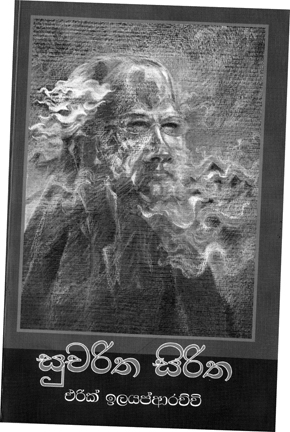A deserving tribute to a great literary critic
Reviewed by Neil Christopher
Sucharitha Siritha
Author: Eric Illayaparachchi
It is an indisputable fact that Prof. Sucharitha Gamlath was an
authority of Sinhala literary criticism and without a thorough and
assiduous study of his writings none can tread along the path of Sinhala
literature.
 Jacque Derrida, I remember, once said, “Without the ghost of Mark
human race can have no future.” It is true to say that without the ghost
of Sucharitha Gamlath Sinhala literary criticism can have no future. In
fact, with the demise of Gamlath Sinhala literary criticism has become a
widow. Jacque Derrida, I remember, once said, “Without the ghost of Mark
human race can have no future.” It is true to say that without the ghost
of Sucharitha Gamlath Sinhala literary criticism can have no future. In
fact, with the demise of Gamlath Sinhala literary criticism has become a
widow.
Strenuous task
It is really a strenuous task to encapsulate the contribution of such
an intellectual giant in a book and it is more difficult and arduous
task to grasp that contribution, multi-dimensional, in a poem. Eric
Illayaparachchi seems to have taken up the challenge of doing so and his
Sucharitha Siritha’ succeeds in meeting the challenge to a greater and
commendable extent.
Prof. Gamalath radiated invaluable inspiration on the young
generation. He was in fact the greatest intellectual warrior of our
times and deserves to be called the Plekhanov of Sri Lanka.
Illayaparachchi seems to have made an attempt to touch the falls and
rises of Gamlath in a form of poetry and explores the massive
intellectual toiling Gamlath had with a view to establishing true
methodology of literary criticism, earlier shrouded by the cobwebs of
mysticism, romanticism, spiritual idealism and what not.
What is quite evident in Illayaparachchi's poem is his sincere sense
of tribute to late Prof. Gamlath.
Man of letters
To narrate a character of a great man of letters, a poet should have
deep a understanding of the classical poetic tradition of the language
he uses and it is to his credit that the poet displays his mastery of
classical poetic diction.
The poet seems to follow the Sandesa Kavya (messege poem) tradition
to unveil the character of Prof. Gamlath who was first a Bhikkhu and
whose role in that capacity is little known. In the form of a letter
written by Gamlath's sister the poet uses his imagination to delve into
the possible ruminations of a young Samanera.
Prof. J.B. Disanayaka once said that Prof. Gamlath had written a book
of poetry called, Nura Gini Del, using a Pseudonym, about which is also
little known. If Illayaparachchi made an attempt to get hold of a copy
of that book, he could sense the way of thinking of his protagonist as a
budding writer.
Prof. Gamlath in many of his writings, Guru Guna Samara, in
particular, a tribute to the late Prof. Sarachandra, has painted a
picture of exaggeration about the University of Peradeniya but in the
light of Gunadasa Amerasekera. Illayaparachchi compares the university
to a carrion. Here the poet displays his critical perspective and leaves
the reader to re-think about what has been said about the University of
Peradeniya during 1950s and 1960s.
Sarcasm
Gamlath's stay in London as a person reading for his PhD is finely
narrated by the poet with some ironic sarcasm.
Although the poet says that Gamlath and other Sinhala intellectuals
who were then in London discussed the destiny of Sir Lanka, I do not
think that apart from Sugathapala Silva most of others, after coming
back to Sri Lanka, do not seem to have consciously involved in what the
poet imagines.
The poet brings into exposure some realities prevalent in the country
after the country was made a Democratic Socialist Republic just
constitutionally, and how making Sinhala as the official language led
the majority into ethnic masturbation while the minority was
disappointed over their bleeding fate to experience subsequently.
The period when Gamlath worked as a lecturer in the University of
Jaffna does not seem to have been explored well by the poet.
The intellectual bridge they could have built in the capacity as
civil personalities between the two major ethnic groups and the
discourse they could have given rise seem to be beyond the grasp of the
poet.
The role of Prof. Gamlath, expelled from the university service and
as a card-carrying member of a revolutionary party, which made Gamlath a
Marrist aesthetician of recognition seems also to have slipped from the
grasp of the poet.
Many so-called intellectuals had harboured a grudge against Gamlath
for he single-handedly challenged them and showed their stark nudity
with regard to the application of knowledge to assess the quality of a
work of art.
They expected Gamlath to follow Prof. Sarachchandra. As the poet says
they as Brahmins expected him to do so but Gamlath entered boldly the
danger zone where conspiracy of silence and stinking feudalism reigned.
As the poet says Gamlath had to place his neck on the guillotine of
feudalism. The universities had become temples of obscurantism and the
discourse Gamlath had been promoting was shamelessly overlooked.
The poet is artistically excellent when he narrates Gamlath's visit
to his first alma mater, the temple where he was ordained as a Bhikkhu.
Inspite of the fact that there are so me instances where the poet
seems to have been misinformed about some facts relating to the events
occurred in the complication of Gamlath's English-Sinhala Dictionary,
the poet has been fair by Gamlath to a greater extent and
Illayaparachchi deserves to be called an excellent biographical poet.
|

